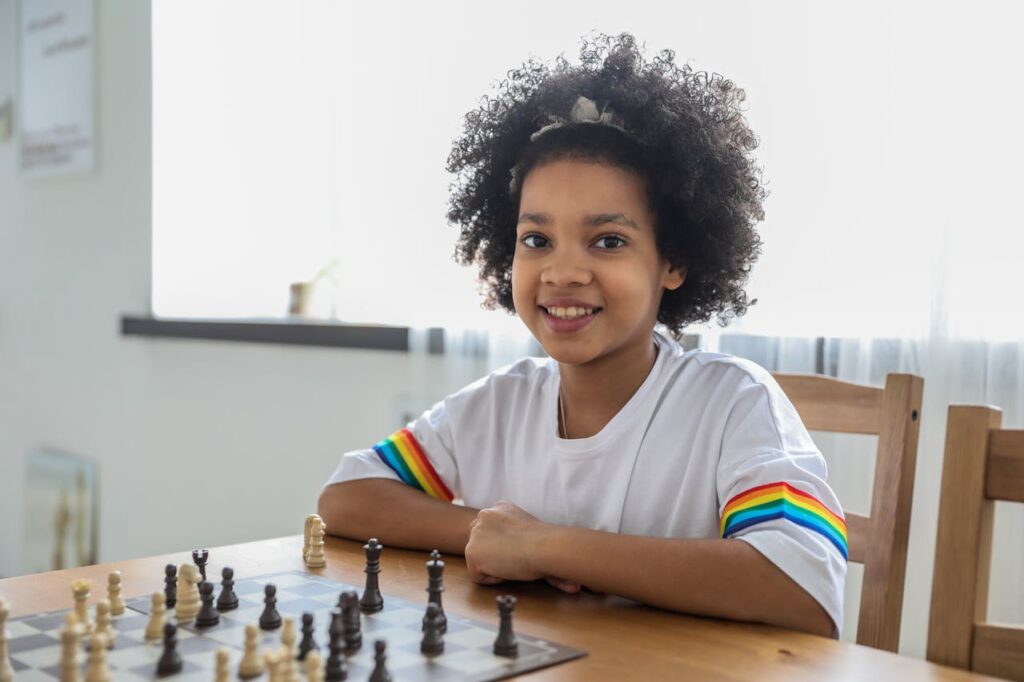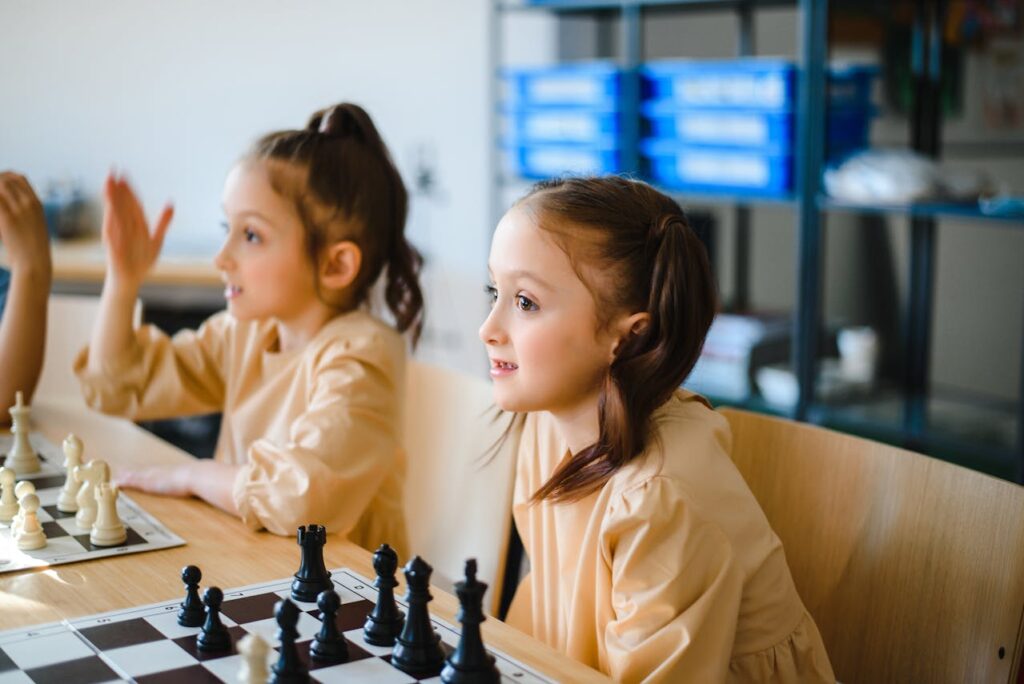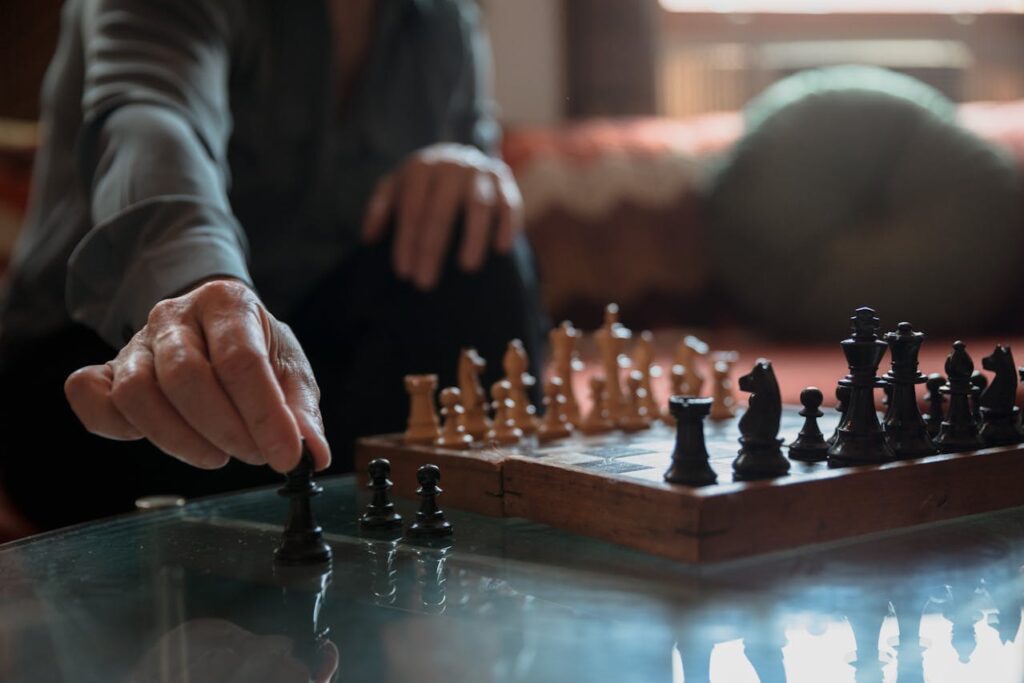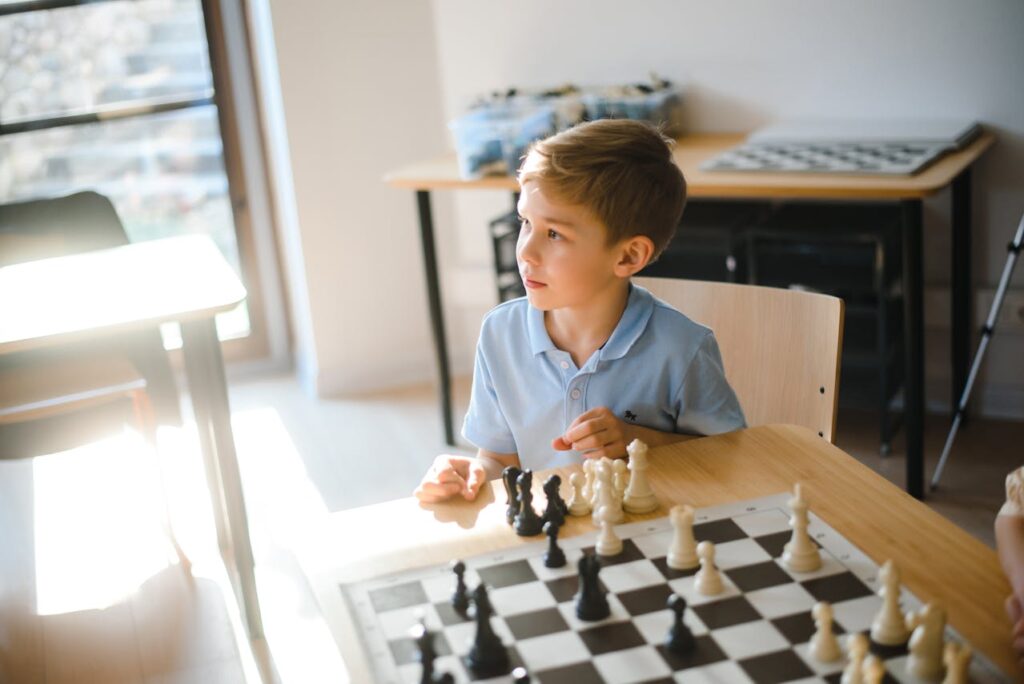Critical thinking is an essential skill in today’s world. It’s the ability to analyze information, evaluate different perspectives, and make well-informed decisions. Yet, teaching this skill to children can sometimes feel like a daunting task. How do you make such an important, yet complex, skill engaging and enjoyable for young minds? The answer might be simpler than you think: chess.
Chess is not just a game; it’s a powerful tool for developing critical thinking in a fun and interactive way. As children learn the rules and strategies of chess, they naturally engage in problem-solving, decision-making, and strategic planning. These are all key components of critical thinking. The best part? They’re having fun while doing it.
Why Chess Is the Perfect Tool for Developing Critical Thinking
Chess is often referred to as the “game of kings,” but it’s also the game of thinkers. The strategic nature of chess requires players to engage in deep thought, considering not just their own moves, but also anticipating their opponent’s actions.
Encourages Strategic Planning
One of the core aspects of critical thinking is the ability to plan ahead. In chess, players must think several moves in advance, considering the potential consequences of each move they make.
This requires a level of foresight and strategic planning that is directly transferable to real-life situations.
For children, learning to plan ahead in chess helps them develop the habit of thinking before acting.
They begin to understand the importance of considering the outcomes of their decisions, both in the game and in other areas of life.
This strategic thinking skill is essential for success in school, work, and personal relationships.

Teaches Problem-Solving
Chess is essentially a series of problems that need to be solved. Each position on the board presents a new challenge, and players must figure out the best way to proceed.
This constant problem-solving is a fantastic way to develop a child’s ability to think critically.
In chess, there is often no single “right” answer to a problem. Instead, players must weigh different options, consider the pros and cons of each, and make a decision based on the information available.
This process of evaluating options and making informed decisions is at the heart of critical thinking.
Enhances Decision-Making Skills
Every move in chess is a decision that can have significant consequences.
Whether it’s deciding which piece to move, when to attack, or how to defend, each decision requires careful thought and consideration.
This process of making decisions under pressure is a key aspect of critical thinking.
In chess, children learn to make decisions based on both logic and intuition. They must analyze the position on the board, consider their options, and choose the best course of action.
This decision-making process helps them develop the ability to think quickly and accurately, even in high-pressure situations.
Promotes Logical Thinking
Chess is a game of logic, where every move is governed by a set of rules. To succeed in chess, players must think logically, considering the implications of each move and how it fits into the overall strategy.
This emphasis on logical thinking is one of the reasons why chess is such an effective tool for developing critical thinking skills.

Logical thinking in chess involves understanding cause and effect—how each move affects the position on the board, and what the potential outcomes might be.
By practicing this kind of thinking in chess, children learn to apply logic to other areas of life, such as solving puzzles, tackling academic challenges, and making everyday decisions.
Practical Tips for Using Chess to Build Critical Thinking Skills
Now that we’ve discussed why chess is such an effective tool for developing critical thinking, let’s explore some practical ways you can use chess to help your child or students enhance these skills.
Whether your child is just starting out or already has some experience with the game, these tips will help make chess a fun and educational experience.
Start with Simple Scenarios
If your child is new to chess, it’s important to start with simple scenarios that allow them to grasp the basic concepts of the game.
Begin by focusing on individual pieces and their movements. For example, you might set up a mini-game where they only use pawns, or where they have to practice moving a knight around the board.
These simplified scenarios help children understand the basic rules and develop a sense of how the game works, without overwhelming them with too many options.
As they become more comfortable, you can gradually introduce more pieces and more complex situations.
Encourage Reflection After Each Game
One of the most powerful ways to develop critical thinking through chess is by encouraging reflection after each game.
Win or lose, it’s important for children to think about what happened during the game, what decisions they made, and what they could have done differently.
If your child prefers to reflect on their own, encourage them to keep a chess journal.
In it, they can record the games they play, note down key moves or strategies, and write about what they learned from each game.
This practice not only reinforces their learning but also helps them track their progress over time.
Introduce Chess Puzzles
Chess puzzles are an excellent way to sharpen critical thinking skills. These puzzles present specific positions on the board and challenge players to find the best move or series of moves.
By solving these puzzles, children practice analyzing the board, considering different possibilities, and making strategic decisions.
Start with simple puzzles that focus on basic tactics, such as checkmates in one or two moves.
As your child’s skills improve, you can introduce more complex puzzles that require deeper thinking and longer sequences of moves.
Many chess books and online platforms offer a wide range of puzzles categorized by difficulty level, making it easy to find puzzles that are appropriate for your child’s skill level.
Encourage Playing Against a Variety of Opponents
One of the best ways to develop critical thinking through chess is by playing against a variety of opponents.
Each opponent brings their own style, strategies, and challenges, forcing your child to adapt and think critically in different ways.
Encourage your child to play against both stronger and weaker players.
Playing against stronger opponents helps them learn new strategies, think more deeply about their moves, and push their limits.
Meanwhile, playing against weaker opponents gives them the opportunity to practice implementing what they’ve learned and refine their strategies.
Teach the Value of Patience and Deliberation
One of the most important lessons chess teaches is the value of patience and careful deliberation. Rushing into a move without thinking it through can lead to mistakes and missed opportunities.
By teaching your child to take their time, consider all their options, and think several moves ahead, you help them develop a more thoughtful and measured approach to decision-making.

You can also reinforce this lesson by setting a good example when playing against your child.
Take your time with your own moves, explain your thought process as you play, and demonstrate the importance of considering all possibilities before making a decision.
This modeling helps your child internalize the value of patience and thoughtful deliberation.
Making Chess Fun While Developing Critical Thinking
While the benefits of chess are clear, it’s important to remember that the game should remain fun and engaging, especially for children.
The key to fostering a love of chess while developing critical thinking skills is to strike a balance between learning and enjoyment.
Here are some creative ways to keep chess enjoyable while still focusing on building those all-important cognitive skills.
Incorporate Storytelling into Chess
One way to make chess more engaging for younger children is to incorporate storytelling into the game. Each piece on the chessboard can be given a character and a role in a larger narrative.
For example, the king might be a wise ruler, the queen his powerful ally, and the knights the brave warriors defending the kingdom.
As the game unfolds, you can narrate the story of these characters and their adventures on the chessboard. This approach not only makes the game more entertaining but also helps children remember how the pieces move and interact with each other.
By turning each game into a story, you can spark your child’s imagination and make chess a more memorable and enjoyable experience.
Storytelling can also be used to introduce new concepts and strategies. For instance, you might tell a story about how the king needs to escape a dangerous situation, leading to a lesson on how to avoid checkmate.
Use Chess Variants to Keep Things Fresh
To keep chess exciting, consider introducing your child to different chess variants. These are alternative versions of the game that introduce new rules, pieces, or objectives.
Chess variants can be a fun way to challenge your child’s thinking and keep the game feeling fresh and new.
Some popular chess variants include:
- Chess960 (Fischer Random Chess): In this variant, the starting positions of the pieces are randomized, requiring players to think creatively from the very first move.
- Bughouse Chess: This is a team-based variant where two players work together, and captured pieces can be passed to the partner to place on their board.
- King of the Hill: The objective in this variant is not only to checkmate the opponent’s king but also to get your king to one of the four central squares of the board.
These variants encourage children to think outside the box and adapt to new situations, further enhancing their critical thinking skills.
By introducing these different formats, you can prevent the game from becoming repetitive and keep your child excited about playing chess.
Organize Friendly Competitions
Children often thrive on a bit of friendly competition, and organizing small chess tournaments or challenges can be a great way to motivate them to think critically and improve their skills.
These competitions can be held with family members, friends, or even online opponents.
To keep the atmosphere positive and supportive, focus on participation and learning rather than just winning.
You might offer small prizes for achievements like the most creative move, the best use of a particular piece, or the quickest checkmate.
These rewards can help encourage children to experiment with different strategies and think more deeply about their moves.

If your child is interested, you can also involve them in planning the tournament, such as setting up the matches or creating a leaderboard. This involvement gives them a sense of ownership and responsibility, further enhancing their engagement with the game.
Make Use of Online Chess Platforms
In the digital age, there are numerous online platforms and apps designed to make chess fun and accessible for children.
These platforms often include features like interactive lessons, puzzles, and online play against opponents from around the world.
By incorporating technology into your child’s chess learning, you can add an extra layer of engagement and excitement.
Online chess platforms are particularly effective for developing critical thinking because they often provide instant feedback on moves, allowing children to learn from their mistakes in real-time.
Many platforms also offer tutorials and challenges that are tailored to different skill levels, ensuring that your child is always learning and improving at a pace that suits them.
Balance Learning with Play
While it’s important to focus on developing critical thinking skills through chess, it’s equally important to remember that play is a vital part of learning.
Children naturally learn best when they are having fun, so it’s crucial to strike a balance between structured learning and free play.
Allow your child to explore the game on their own terms, without too much direction or pressure. Let them experiment with different moves, try out new strategies, and even make mistakes.
This freedom to explore helps them develop a deeper understanding of the game and encourages creative thinking.
The Long-Term Benefits of Chess for Critical Thinking
Chess is more than just a game; it’s a powerful tool for cognitive development that offers long-term benefits far beyond the chessboard. By helping your child develop critical thinking skills through chess, you’re giving them a foundation that will support their success in many areas of life.
Transferable Skills for Academic Success
The critical thinking skills developed through chess are directly transferable to academic success.
As children learn to analyze situations, evaluate options, and make strategic decisions in chess, they build the cognitive abilities needed to excel in subjects like math, science, and reading.
For example, the problem-solving skills honed in chess can help children tackle complex math problems, while the ability to think several steps ahead is valuable in science experiments and research projects.
The logical thinking required in chess is also beneficial for understanding and interpreting texts, making arguments, and writing essays.
Preparing for Real-World Challenges
Critical thinking is an essential skill for navigating the complexities of the modern world.
Whether it’s making informed decisions, solving problems, or adapting to new situations, the ability to think critically is crucial for success in both personal and professional life.
Chess provides a safe and structured environment where children can practice these skills and build confidence in their ability to handle challenges.
As they face different scenarios on the chessboard, they learn to assess risks, consider different perspectives, and make decisions based on careful analysis.
These experiences help them develop a mindset that is both analytical and adaptable, preparing them to tackle real-world challenges with confidence and resilience.
Moreover, the patience, focus, and perseverance developed through chess are valuable life skills that support success in any field.

Lifelong Benefits of a Growth Mindset
One of the most important lessons chess teaches is the value of a growth mindset—the belief that abilities can be developed through effort, learning, and perseverance.
This mindset is crucial for long-term success, as it encourages children to embrace challenges, learn from mistakes, and keep striving for improvement.
In chess, every game is an opportunity to learn and grow. Whether your child wins or loses, they gain valuable insights that help them become a better player.
This focus on continuous improvement fosters a love of learning and a positive attitude toward challenges, both of which are essential for success in all areas of life.
By helping your child develop a growth mindset through chess, you’re setting them up for a lifetime of personal and intellectual growth.
Conclusion
Chess is more than just a game; it’s a gateway to developing critical thinking skills that are essential for success in today’s world.
By making chess a part of your child’s life, you’re helping them build the cognitive abilities, decision-making skills, and strategic thinking that will serve them well in both their academic journey and beyond.
Through chess, children learn to think critically in a fun and engaging way.
They develop the ability to plan ahead, solve problems, make informed decisions, and think logically—all while enjoying the excitement and challenge of the game.
These skills are not only valuable for success in school but also for navigating the complexities of life with confidence and resilience.
READ NEXT:

